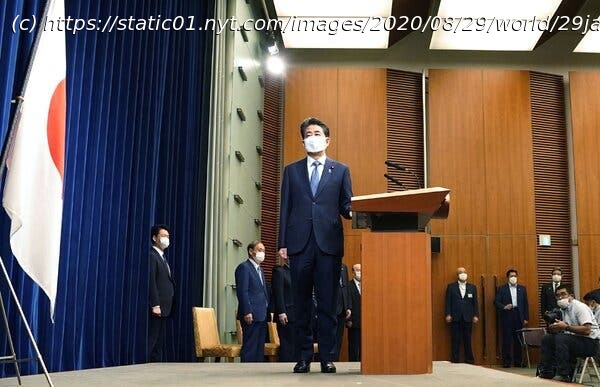The coronavirus, a tanking economy, an aggressive China, a postponed Olympics, a U.S. election: That’s just the start. And any successor will confront those challenges without the stature of Shinzo Abe.
Prime Minister Shinzo Abe of Japan is leaving office a year early with no obvious successor. But whoever ultimately emerges from the fierce jockeying within his party will face a clear set of monumental challenges. The coronavirus, although relatively contained now, could yet rage out of control. The Japanese economy, the world’s third largest, has taken a historic nosedive. Chinese military aggression is rising in the region. Decisions must be made about whether the postponed Tokyo Olympics can actually be held next summer. A hugely contentious presidential election in the United States, Japan’s closest ally, is a little more than two months away. And those are just the present dangers. In the longer term, Japan’s next leader faces the unfinished business of Mr. Abe’s promises to advance women in politics and the workplace, and to improve working conditions so that men can help more at home. The country is confronting labor shortages as it grapples with a shrinking population and a stubbornly low birthrate, as well as snags in bringing in foreign workers. With the highest proportion of elderly people in the world, Japan could soon struggle to meet pension obligations and provide health care to the aging public. Not to mention natural disasters turbocharged by climate change, Japan’s energy vulnerabilities from its post-Fukushima nuclear shutdown, the threat of missile attacks by North Korea, and a low ebb in relations with South Korea. “It makes me wonder why anybody would want to be prime minister,” said Jeffrey Hornung, an analyst at the RAND Corporation. But there is no shortage of aspirants. Mr. Abe’s conservative party, the Liberal Democratic Party, will announce on Tuesday whether it will call an extraordinary election limited to its members of Parliament and a few prefectural representatives, or a vote that would involve all the party’s one million members. (For the opposition to field a prospective leader, there would need to be a general election.) Those who have already announced their desire to stand for the prime ministership include Fumio Kishida, a former foreign minister; Toshimitsu Motegi, the current foreign minister; Taro Kono, the defense minister; Shigeru Ishiba, a former defense minister who once ran against Mr. Abe for party leader; Seiko Noda, a member of the lower house of Parliament; and Tomomi Inada, another former defense minister. The eventual successor to Mr. Abe, who cited ill health in announcing his resignation on Friday, will confront the many challenges dogging Japan without the stature he had built over a record-setting run of nearly eight years in power. Fundamentally, Japan remains an orderly and prosperous nation. Still, its longer-term issues are so deeply entrenched that not even Mr. Abe’s long tenure was sufficient to remedy them.






